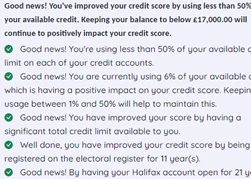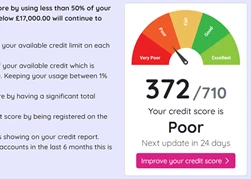How Do I Check My Credit Score

3rd Jan 2024
Understanding how your credit score is calculated, and monitoring how the numbers change over time is crucial for financial well-being. A good credit score improves your chances of being approved when you apply for new credit being granted good terms. Here's a guide on how to check your credit score, why it matters, and the steps to interpret and improve it.
Why Bother to Check Your Credit Score?
Your credit score is a measure of your financial history and can have a big impact on financial opportunities. A higher credit score means you are more likely to be approved for any credit you apply for and can help you get lower interest rates.
Checking your credit score is simple and free. You can go online or download one of the many apps which are on the market and will let you check your credit score and track how it changes over time. All you need to get started is to set up an account on the website with a username and password. You will have to fill in your name, address, salary details and tell them about what loans and other credit products you already have.
Once you have set up your account, you can log in and see your credit score expressed in numbers. Each credit referencing agency uses a different scale, so it’s perhaps more important to look at the category such as average, good, or poor rather than the actual numbers.
Interpreting Your Credit Score
Credit agencies all have their own scales for calculating credit reports, with scores ranging from 700 to 999. Higher scores indicate better credit. Track your credit score over time to see if the numbers are getting better, worse, or staying the same. If you find that your credit score falls into the poor or below average category, then there are things you can do to improve matters. Improving your credit score will give you access to a wider range of financial products, often with better interest rates.
Make sure that you are registered to vote, as this is the easiest way of verifying your address. This is free to do and can be done online. Keep an eye on your regular bill payments to make sure that you are not penalised for missing payments or making late payments. If you can, set up direct debits so that payments go out of your accounts automatically. If you suspect that your credit score is being affected by dormant accounts which you are no longer using, consider whether closing them would be a better option.
Impact of Checking Your Credit Score
Checking your own credit score is classed a soft search and will do no harm to your credit rating. Soft searches for checking your own credit record or eligibility checkers for financial products, are invisible to lenders and won't impact your credit report. Get into the habit of checking your credit score every month or six weeks, and if you see that the rating is beginning to fall, take steps to address the slide.
Don't risk missing
something important
Access a comprehensive credit report
that includes detailed data from TransUnion
View your credit score for only £1.95.
You can view it for 1 month, after which it will be £14.95 per month unless cancelled.
See How You Score

See How You Score
An Independent View Of Your Credit Score
Lenders typically use their own systems to calculate your Credit Score based on the information in your Credit Report, often checking with one or more Credit Reference Agencies. Your Credit Check Online Credit Score is derived from all the Credit Report information we gather from TransUnion, helping you understand how you might be assessed when applying for credit.

Understand What is Affecting Your Credit Score
Quickly see how the details in your Credit Report influence your Credit Check Online Credit Score, both positively and negatively. This clear overview helps you identify areas for improvement and better understand the factors that lenders consider when assessing your creditworthiness.
View your credit score for only £1.95.
You can view it for 1 month, after which it will be £14.95 per month unless cancelled.